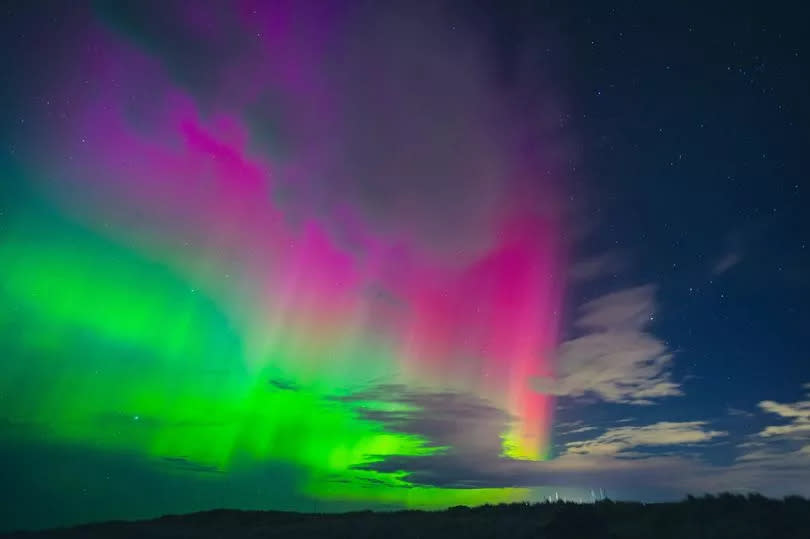Northern Lights could return tonight as 'strong geomagnetic storm likely'
The Northern Lights could dazzle UK skies for the third consecutive night as another geomagnetic storm brings the potential for a spectacular light show this evening.
Channel 4 weather presenter Liam Dutton took to X to announce the oncoming solar flares. The meteorologist explained that solar activity will be on the rise today, although conditions may not be ideal.
He wrote on X (formerly Twitter: "**Latest NOAA (National Oceanic and Atmospheric Administration) Space Prediction** Further coronal mass ejections (CMEs) expected to arrive on Sunday."
Liam continued: "This means another strong or extreme geomagnetic storm is likely. Therefore, there may be another UK-wide showing of the aurora borealis on Sunday night - cloud permitting."
However, a thunderstorm warning will be in effect across Scotland tonight, with "intense downpours" hindering stargazing. The stormy weather will be breaking out in western Scotland with further heavy rain expected in the south on Sunday evening.
In another message, the presenter added: "Geomagnetic activity will increase again today, however, as with last night, peak activity may not coincide with darkness. There'll also be much more cloud around tonight, with clear spells limited. So, the chances of spotting the will be reduced somewhat."
AuroraWatch UK, operated by Lancaster University, has issued alerts for potential Northern Lights sightings in parts of the UK. The service indicated that the Shetland Islands and areas around Aberdeenshire are prime spots for tonight's celestial display, reports NottinghamLive.
According to the NOAA, a monumental G5 geomagnetic storm, considered as "extreme" and the highest level of solar storm, struck Earth on Thursday. A primary cause of this magnificent spectacle - a "large, complex" cluster of sunspots - was 17 times the diameter of Earth.
Royal Museums Greenwich explained that the Northern Lights, caused by flares emitted from the Sun, can usually be viewed in places closer to the poles in both northern and southern hemispheres.

In further explanation, the museum noted: "Solar storms on our star's surface give out huge clouds of electrically charged particles," which travel millions of miles including some that end up colliding with our planet, Earth."
Over the weekend, an overwhelming number of people across the northern hemisphere got treated to the exceptional views of the aurora borealis, far from their usual sighting locations within the Arctic Circle.
Stargazers across Scotland were treated to an otherworldly show when the sky was lit up by colourful bands of light. Unfortunately, the spell of stormy weather means the sky won't be clear to view the Northern Lights if they appear tonight.
Join the Daily Record's WhatsApp community here and get the latest news sent straight to your messages.

 Yahoo News
Yahoo News 
